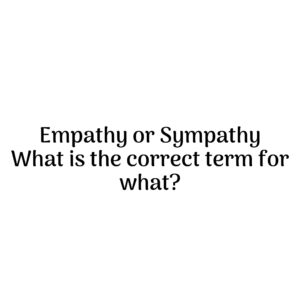When I first heard English speakers use the word “empathy,” I was confused.
As a native Greek speaker, I knew this word—but it didn’t mean what they thought it meant.
It took me time to realize that in English, “empathy” had been borrowed from Greek, but the meaning was reshaped into something completely different. And since lately there has been so much discussion about empathy, sensitivity, and emotional awareness, I want to share a perspective that rarely gets talked about—the original Greek roots.
Because words matter.
Words carry energy.
And when we use them without knowing their origin, we might unconsciously be shaping the way we experience ourselves and the world.
What Does “Empathy” Really Mean?
In modern Greek, the word εμπάθεια (empathia) does not mean compassion, sensitivity, or understanding. Quite the opposite.
It means:
- To be overwhelmed with strong emotions (usually negative).
- To be blinded by hatred or resentment towards someone.
- To be consumed by passion that distorts your perception.
In other words, empathy in Greek is not a gift—it is a trap.
If we go back further, to ancient Greek, we see the same root:
- En (εν) = inside
- Pathos (πάθος) = passion, strong emotion
So, em-pathia meant to be inside passion, submerged in emotion so strongly that you might lose the ability to separate what is yours and what isn’t.
This is very different from the English version of “empathy,” which describes the ability to understand and share someone else’s feelings.
What About “Sympathy”?
Now let’s look at συμπάθεια (sympathia):
- Syn (συν) = with
- Pathos (πάθος) = passion, emotion
Sympathy means:
- To be with someone in their suffering.
- To recognize what they feel, while remaining yourself.
- To offer presence, support, and kindness without losing yourself in their emotional state.
Sympathy is standing beside someone and saying: “I see your pain, and I am with you.”
It’s not drowning in their emotions. It’s not confusing their pain with your own.
It’s presence, connection, and compassion.
Why This Matters for Healers, Empaths, and Truth Seekers
Many sensitive souls today call themselves “empaths.”
But if we trace the original meaning, that identity is not empowering—it is limiting.
To be an empath (in the Greek sense) means to lose yourself in other people’s emotions, to be consumed by what is not yours.
No wonder so many “empaths” feel exhausted, drained, and overwhelmed.
What if, instead, we started calling ourselves “sympaths”?
Ones who feel with others, without abandoning themselves.
Ones who stand present, grounded, and connected, instead of swallowed up by energy that is not theirs.
Words Are Energy—Choose Them Wisely
Every word we speak carries power.
Every label we place after “I am” becomes a spell we live under.
So ask yourself:
- Do I want to keep identifying as someone who loses themselves in others’ emotions?
- Or do I want to choose words that remind me of my strength, my presence, and my sovereignty?
Changing a single word might seem small, but it can break the unconscious spell that keeps you stuck.
It can be the beginning of reclaiming your energy and stepping fully into your truth.
Remember!
Language shapes reality. When we reclaim the true meaning of words, we reclaim a piece of our power.
If you’ve been calling yourself an “empath,” maybe it’s time to feel into the shift of becoming a sympath instead. Someone who is compassionate, present, and sovereign—with others, but never lost in them.
Because the words we choose aren’t just communication. They are creation.




